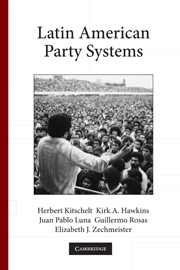Book contents
- Frontmatter
- Contents
- List of Tables
- List of Figures
- Preface
- Introduction: Party Competition in Latin America
- 1 Patterns of Programmatic Party Competition in Latin America
- PART I DESCRIBING PROGRAMMATIC STRUCTURATION
- Part II CAUSES AND CORRELATES OF PROGRAMMATIC PARTY SYSTEM STRUCTURATION: EXPLAINING CROSS-NATIONAL DIVERSITY
- 6 Long-Term Influences on the Structuring of Latin American Party Systems
- 7 Democratic Politics and Political Economy since the 1980s: Transforming the Programmatic Structure of Latin American Party Systems?
- 8 Programmatic Structuration around Religion and Political Regime
- 9 Programmatic Structuration and Democratic Performance
- 10 Conclusion
- Appendix A Description of Variables, Data Issues, and Research Design
- Appendix B List of Variables
- Appendix C English Translation of Relevant Portions of the Salamanca Survey
- Bibliography
- Index
- Titles in the Series
9 - Programmatic Structuration and Democratic Performance
Published online by Cambridge University Press: 05 June 2012
- Frontmatter
- Contents
- List of Tables
- List of Figures
- Preface
- Introduction: Party Competition in Latin America
- 1 Patterns of Programmatic Party Competition in Latin America
- PART I DESCRIBING PROGRAMMATIC STRUCTURATION
- Part II CAUSES AND CORRELATES OF PROGRAMMATIC PARTY SYSTEM STRUCTURATION: EXPLAINING CROSS-NATIONAL DIVERSITY
- 6 Long-Term Influences on the Structuring of Latin American Party Systems
- 7 Democratic Politics and Political Economy since the 1980s: Transforming the Programmatic Structure of Latin American Party Systems?
- 8 Programmatic Structuration around Religion and Political Regime
- 9 Programmatic Structuration and Democratic Performance
- 10 Conclusion
- Appendix A Description of Variables, Data Issues, and Research Design
- Appendix B List of Variables
- Appendix C English Translation of Relevant Portions of the Salamanca Survey
- Bibliography
- Index
- Titles in the Series
Summary
After empirically documenting the varying degrees to which Latin American party systems were programmatically structured in the late 1990s, our study has explained the observed cross-national pattern with a theory of programmatic alignments that emphasizes long-term investments in the development of partisan competition. Beyond this contribution to the research field on parties and party systems, our results gain significance for the comparative study of political systems if they also speak to questions of democratic performance and political economy. Do patterns of programmatic party structuring leave imprints on the democratic process, on political performance, and on the evaluation of democracy? If so, this would provide persuasive evidence that PPS, and more specifically economic PPS, the issue dimension that has the strongest profile in the greatest number of Latin American countries, is a critical intermediary mechanism shaping the empirical quality and possibly the durability of democracy.
We thus focus on economic party system structuration as the most powerful dimension of PPS in Latin America that may affect the quality (actual and perceived) and durability of democracies in the region. We address four baskets of phenomena: intensity and modes of political participation; stability and predictability of democratic competition; the quality of policy making and governance; and support for the democratic polity.
Concerning the first basket, the presence of programmatic partisan alternatives in elections clarifies the stakes of democratic competition and may tell citizens that it is meaningful and relevant to participate in democratic politics, to exercise their voice, and to turn out to vote.
- Type
- Chapter
- Information
- Latin American Party Systems , pp. 279 - 305Publisher: Cambridge University PressPrint publication year: 2010



